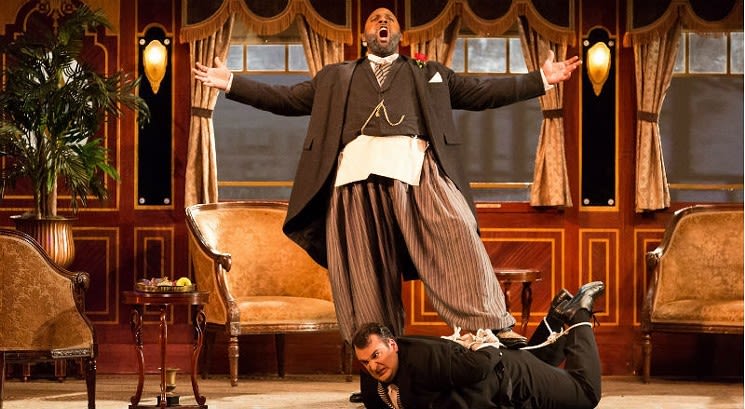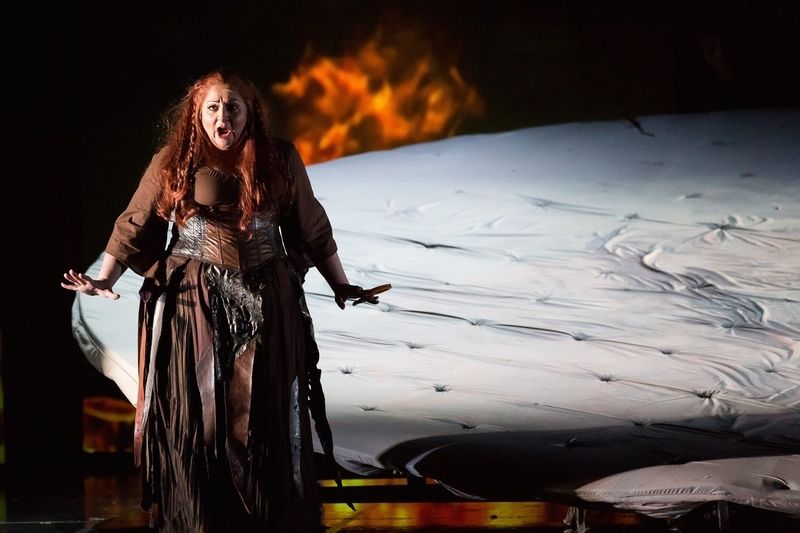Review: The Abduction from the Seraglio Seals an Excellent Season at Houston Grand Opera

Image: LYNN LANE
Only Mozart could turn an opera about kidnapping into comedic gold.
Running concurrently with Houston Grand Opera's production of Richard Wagner’s Götterdämmerung, a mighty four-year culmination of the German composer's epic Ring Cycle, HGO’s production of Mozart’s well-written 1782 Die Entführung aus dem Serail (The Abduction from the Seraglio) is like sorbet after a hardy dinner: refreshingly light, but nonetheless great.
The opera follows a rescue mission after Turkish pirates capture two Spanish noblewomen, Konstanze and her maidservant Blonde, and Pedrillo, a valet who works for Konstanze’s fiancé Belmonte. They are sold to a rich Turk, Pasha Selim, who falls in love with Konstanze. Never fear, Belmonte is quick to save the day.
James Robinson’s production (loyal HGO fans might remember it from the 2001-2002 and 2007-2008 seasons) moves Mozart’s original setting from a lavish 16th-century seaside palace to a 1920s Orient Express train, complete with posh compartments that chug along from start to finish. The mahogany paneling, green plush settees and dark red accents strike a satisfying visual chord. The few inconsistencies—like when Belmonte assures Konstanze he’s hired a ship to rescue her—serve the overall comedic narrative.
Bass-baritone Ryan Speedo Green is both the opera's standout star and least likable character as Osmin, Pasha Selim’s overseer and harem guard. From his first major aria—where he hog-ties Pedrillo and sings about how he’ll mangle, strangle, rip and tear him apart—he was a fantasy of sonorous, rumbling tone and accuracy. Green has mastered the trick of Mozart, who remains hands down the most adroit opera composer ever—you have to make something really difficult to sing effortlessly.
But Mozart got the best of the rest of the cast, a mediocre mixed bag of complementary strengths. There was a lot of “plant and sing,” a throwback to the old school days of early 20th-century soprano Olive Fremstad where acting mattered much less than a good voice. In the role of Konstanze, soprano Albina Shagimuratova delivered on the coloratura—wild ornamented turns, trills, and leaps—but belted in place with a loose vibrato, falling short of her character’s youthful purity. Alternatively, as her handsome fiancé Belmonte, tenor Lawrence Brownlee dealt a silky tone but couldn’t handle some of the more challenging intricacies, like the delicate turns and arpeggios of Mozart’s writing. Likewise, soprano Uliana Alexyuk as Blonde was indeed blond and beautiful, but struggles with clarity; Chris Bozeka, in the tenor role of Pedrillo, acted well but couldn’t strike a compelling tone.
It’s hard to sing Mozart, no doubt about it, and it’s also hard to believe Mozart was only 26 years old when he composed this tightly constructed comedy about abduction. Austrian conductor Thomas Rösner, shaking his head with every baton stroke, did the opera justice with flare. The overture was a merry flourish, and the balance with the singers was perfect. He pulled sweet sounds and droll emotion from the orchestra, capturing all of Mozart’s early brilliance with passion. Garnering more than a few chuckles from the audience thanks to the comedy that ensues on stage, it’s a very different experience from last week’s Götterdämmerung. Wagner may have the German gods on his side, but Mozart has the common man.
Thru May 12. $15–354. Wortham Center, 501 Texas Ave. 713-228-6737. houstongrandopera.org




